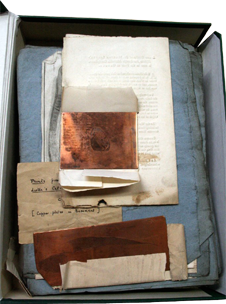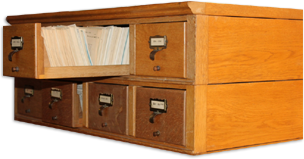* You are viewing Posts Tagged ‘Centre for Editing Lives and Letters’
James Brown
December 14, 2012
Podcasts, Projects and Centres, Publications, Websites and Databases
Tags: Archives, Centre for Editing Lives and Letters, Diplomatic History, England, Materiality, Networks, Seventeenth Century, Sixteenth Century, Union Catalogue
 Those seeking to balance the port and mince pies this holiday season with some state-of-the-art reflections on early modern epistolarity are in luck: the latest issue of Lives & Letters – the free online journal of UCL’s Centre for Editing Lives and Letters – is devoted to New Directions in the Study of Early Modern Correspondence.
Those seeking to balance the port and mince pies this holiday season with some state-of-the-art reflections on early modern epistolarity are in luck: the latest issue of Lives & Letters – the free online journal of UCL’s Centre for Editing Lives and Letters – is devoted to New Directions in the Study of Early Modern Correspondence.
Guest-edited by James Daybell and Andrew Gordon, and developing out of a conference held at Plymouth University in 2011, the issue features an introduction to the latest developments in the field (in which EMLO gets a name-check); eight case studies of particular correspondents and correspondence networks; and a spectacularly useful select bibliography on the manuscript letter in early modern England. All articles are free for download from the journal website. James also contributed to our 2011 seminar series (here’s the podcast), while his latest book on the material letter has just been reviewed by the IHR.
Further to the CFP, you can now book for the one-day conference The Permissive Archive (UCL, Friday 9 November 2012). Celebrating the tenth anniversary of the Centre for Editing Lives and Letters, the fascinating-sounding event will ‘present a wide range of work which opens up archives – not only by bringing to light objects and texts that have lain hidden, but by demystifying and demonstrating the skills needed to make new histories’. Rescuing repositories from their persistent but wildly misleading association with neutrality, inertia, and ‘settled dust’, archival research will be ‘championed as engaged and engaging: a rigorous but permissive field’. Flying the flag for Cultures of Knowledge will be our former  doctoral student Kelsey Jackson Williams (who will present on John Aubrey’s donations to the Ashmolean Museum) and Anna Marie Roos (who, on the same panel, will offer a case study of the complex archival trajectory of four boxes of Martin Lister ephemera [pictured] serendipitously discovered among the holdings of the Sackler Library earlier this year). Other epistolary papers abound.
doctoral student Kelsey Jackson Williams (who will present on John Aubrey’s donations to the Ashmolean Museum) and Anna Marie Roos (who, on the same panel, will offer a case study of the complex archival trajectory of four boxes of Martin Lister ephemera [pictured] serendipitously discovered among the holdings of the Sackler Library earlier this year). Other epistolary papers abound.
The deadline for registrations is 1 November 2012. For further details, the schedule, and to book online, head along to the conference website.
The neglected theme of epistolary archives – the active collection and curation of letter objects and related papers within various social and institutional ecosystems over broad expanses of time – is close to the heart of Cultures of Knowledge, so we’re delighted to see that friends and colleagues at the Centre for Editing Lives and Letters at QMUL are organizing a fascinating-sounding anniversary conference on The Permissive Archive. To be held at CELL in November 2012, the conference ‘seeks presentations from a wide range of work which opens up archives – not only by bringing to light objects and texts that have lain hidden, but by demystifying and demonstrating the skills needed to make new histories’. Aiming to rescue archives from their persistent but wildly misleading association with neutrality, inertia, and ‘settled dust’, the conference invites proposals (which should cover the period 1500-1800) on definitions of permissive archives; the shape of the archive – ideology and interpretation; the archive which challenges or disrupts; dispersed collections; the archivist and the historian; the ethics and comedy of the archive; order and anarchy; and many more exciting topics.
 The deadline for 300-word proposals for 25 minute papers is 31 July 2012. For full details and submission instructions, head along to the conference webpage.
The deadline for 300-word proposals for 25 minute papers is 31 July 2012. For full details and submission instructions, head along to the conference webpage.
The Centre for Editing Lives and Letters at QMUL will be hosting a workshop on Thursday 17 September on ‘Digitizing Correspondence’. The event, which is sponsored by JISC, will allow archivists, editors, and researchers to converge on a range of issues relating to the digitization of letter collections in a context of presentations, round table discussions, and breakout groups. For a draft programme and booking information, please see the workshop webpage.
 Those seeking to balance the port and mince pies this holiday season with some state-of-the-art reflections on early modern epistolarity are in luck: the latest issue of Lives & Letters – the free online journal of UCL’s Centre for Editing Lives and Letters – is devoted to New Directions in the Study of Early Modern Correspondence.
Those seeking to balance the port and mince pies this holiday season with some state-of-the-art reflections on early modern epistolarity are in luck: the latest issue of Lives & Letters – the free online journal of UCL’s Centre for Editing Lives and Letters – is devoted to New Directions in the Study of Early Modern Correspondence.
 doctoral student
doctoral student  The deadline for 300-word proposals for 25 minute papers is 31 July 2012. For full details and submission instructions, head along to the
The deadline for 300-word proposals for 25 minute papers is 31 July 2012. For full details and submission instructions, head along to the 
 Join
Join 